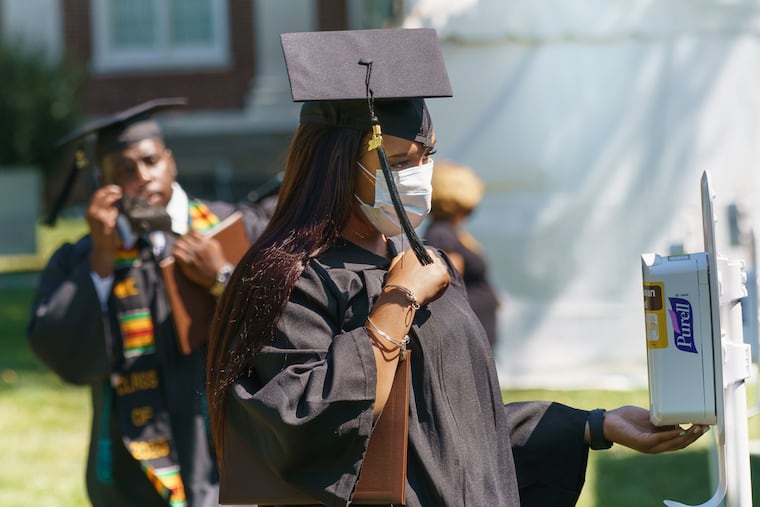N.J. will allow parents to choose all-remote learning as Fauci warns Philly audience there’s ‘no end in sight’ to coronavirus
New Jersey parents will be able to choose remote-only learning for the upcoming school year, a move that acknowledged some may not feel safe sending their children back to classrooms.

New Jersey parents will be able to choose remote-only learning for the next school year, Gov. Phil Murphy announced Monday, a move that acknowledged some may not feel safe sending their children back to classrooms.
Though New Jersey schools have been instructed to provide in-person learning at least part-time, Murphy said the lack of clear evidence about the health risks teachers and students face from the coronavirus creates a tough situation.
“This is about as complex a step as we will take or any American state will take,” Murphy said.
New Jersey is faring better than most states in containing the pandemic: Its seven-day average of new daily confirmed cases dropped to the lowest it has been since the crisis began, reaching 220 on Sunday after several days of steady decrease, according to data analyzed by The Inquirer.
In Florida, where the virus is running rampant, the state teachers’ union sued the governor Monday over his order to fully reopen schools for in-person instruction next month. Meanwhile, California administrators were weighing plans after the governor ordered most counties in the state to open with distance learning only.
And Pennsylvania’s largest teachers’ union last week urged the state to require school districts to make plans for online instruction. Most school districts in the Philadelphia region that have announced reopening plans have said they will offer families not comfortable with sending their children to school a fully virtual option, but Pennsylvania has not required it.
The United States surpassed 140,000 deaths and 3.8 million confirmed cases Monday, according to Johns Hopkins University — nearing the 4 million mark less than two weeks after hitting 3 million people infected.
“Here we are in mid-July with close to 14 million cases globally and 580-plus-thousand deaths so far with essentially no end in sight,” Anthony Fauci, the federal government’s top infectious disease expert, told a virtual audience gathered by the Philadelphia-based American Association for Cancer Research on Monday. (By Monday evening, Johns Hopkins reported more than 14.6 million cases and 608,000 deaths.)
Giving the keynote address at the online conference, Fauci, who is head of the National Institute of Allergy and Infectious Diseases, said physical distancing is still the key “bottom-line common denominator” in battling the virus, along with wearing a face mask in public.
» READ MORE: ‘No end in sight’ to coronavirus, Fauci tells cancer doctors at Philly conference
Pennsylvania reported 711 confirmed new coronavirus cases Monday and three new deaths, the state Department of Health said. Of the newly reported cases, 172 are from Allegheny County, home to Pittsburgh, where cases have been surging.
In Philadelphia — where gyms were allowed to reopen Monday — officials reported 433 new cases of the virus confirmed since Friday. They said expanded testing had led to an influx of results over the last three days.
Across the state, cases among young people continue to climb, outnumbering infections in the 50-and-older demographic. In the southeast region, which includes Philadelphia and its suburbs, 18% of cases this month are among those between the ages of 19 and 24, compared with 5% in April and up a percentage point from earlier in the month. Most of the patients hospitalized and most of the patients who have died are 65 or older.
» READ MORE: Is it safe to return to the gym? How to protect yourself against the coronavirus as gyms reopen.
Pennsylvania state police have done almost 12,000 checks of bars and restaurants since July 1 to ensure compliance with coronavirus safety protocols, the state said. Of those, 3,652 were in the Philadelphia region. Police conducted 211 checks in Philadelphia during the weekend and issued four warnings.
State police have issued 186 warnings to establishments across Pennsylvania this month, according to the data, but none have been cited with a violation. They issued 44 warnings from Friday through Sunday.
New Jersey reported 177 new cases on Monday, a relatively low number, but officials said some test results had been delayed due to a lab issue.
Murphy on Monday also approved resuming contact drills, practices, and competitions for sports such as football and wrestling, provided they take place outdoors and teams follow health and safety protocols.
The state Department of Education plans to release the new guidelines giving parents the option to choose distance learning later this week. Asked if teachers would be offered similar choices regarding remote vs. in-person classes, Murphy said the guidelines would be “focused on kids and parents.”
Under New Jersey’s guidance, local school systems are responsible for determining what school looks like in the fall but must meet minimum guidelines and offer some days of classroom education.
» READ MORE: ‘A lose-lose situation’: Schools try to plan their reopening amid conflicting coronavirus guidelines
Two children under 18 in New Jersey have died after contracting the coronavirus since the outbreak began, both of whom had underlying health complications, Murphy said.
“The problem is, there’s too little known. What is unspoken in that statistic is the extent to which there is transmission of the virus,” he said. “The toughest nut to crack is the passing of the virus from the asymptomatic young, healthy kid to someone who’s older ... or just who’s more vulnerable.”
Staff writers Erin McCarthy, Stacey Burling, Laura McCrystal, Kristen A. Graham, and Maddie Hanna contributed to this article.